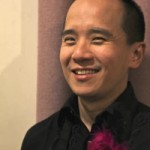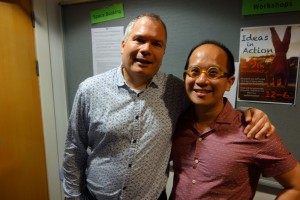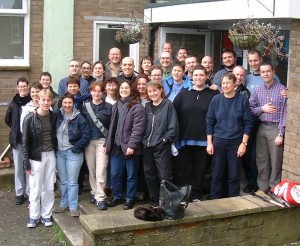
Tenor Hsien sat down with Paul Selous and Rob Kielty, who were in the Pink Singers in the late nineties and early noughties, to find out what it was like to be Pinkies at the turn of the millennium.
Hsien (HC): Hi Paul and Rob, thanks for joining me. When did you join the Pink Singers and how did that happen?
 Paul (PS): I joined the Pink Singers in 1997, from 1997 to 2003. I was working for a lesbian and gay radio station with a temporary licence in London called Freedom FM and I went to an Amsterdam lesbian and gay radio station to see whether we could do a matching up or co-ordination together, and I saw this CD on the producer’s desk and I asked “What’s that?” He said, “That’s from Various Voices”, and I said, “What’s that?” “Well, it’s a lesbian and gay choir festival.” “That’s interesting…” It was about 1996, so I actually went to Various Voices in 1997 in Munich just as an audience member. I loved it so much I thought, “Well, I’m going to join the Pinkies.”
Paul (PS): I joined the Pink Singers in 1997, from 1997 to 2003. I was working for a lesbian and gay radio station with a temporary licence in London called Freedom FM and I went to an Amsterdam lesbian and gay radio station to see whether we could do a matching up or co-ordination together, and I saw this CD on the producer’s desk and I asked “What’s that?” He said, “That’s from Various Voices”, and I said, “What’s that?” “Well, it’s a lesbian and gay choir festival.” “That’s interesting…” It was about 1996, so I actually went to Various Voices in 1997 in Munich just as an audience member. I loved it so much I thought, “Well, I’m going to join the Pinkies.”
I used to sing at school, but life took over and I hadn’t done it since then. I knew how choral music worked, but I couldn’t sight read and still can’t sight read. I was a bit nervous at the first rehearsal which was at the Drill Hall. There were probably about forty people in the choir, slightly more men, with a third women, just before they were awarded a national lottery grant to get more women involved.
 Rob (RK): I joined in 1999, the balance was slipping the other way at that stage. There were more women than men. It really seemed to be the more typical mixed choir balance where you have lots of women and it is quite difficult to find men. It helped that the Drill Hall was a lesbian bar one day in the week, so the women knew it well. Our rehearsals were on Sundays, 2 to 5pm.
Rob (RK): I joined in 1999, the balance was slipping the other way at that stage. There were more women than men. It really seemed to be the more typical mixed choir balance where you have lots of women and it is quite difficult to find men. It helped that the Drill Hall was a lesbian bar one day in the week, so the women knew it well. Our rehearsals were on Sundays, 2 to 5pm.
PS: I really liked the Drill Hall as a rehearsal venue. I liked the vegetarian café in there. I know that some people were not quite so keen on it.
RK: I have happy memories of pizzas and dodgy pastries! I moved down from the Midlands and a friend of mine from university wanted to come along and join the choir and she asked whether I’d come along to support her. The interesting thing is that she came, stayed for a couple of rehearsals and then went off to join the [Diversity] chamber choir, but I stayed behind. I enjoyed the opportunity to get out and meet people from different places, and I did really enjoy the repertoire.
 We were preparing for a concert at the time, in Deptford I think it was, which was my first concert, and a lot of the songs we sang went on to the first CD, although I don’t think that was the intention at the time. It was just great to get involved with something with a performance in it because it was a lot of fun.
We were preparing for a concert at the time, in Deptford I think it was, which was my first concert, and a lot of the songs we sang went on to the first CD, although I don’t think that was the intention at the time. It was just great to get involved with something with a performance in it because it was a lot of fun.
We’d sing two concerts a year, and performances in-between for people who asked really. We didn’t do much in the way of paid concerts I don’t think but we did things which we thought were worthwhile events. We did a concert for a women’s refuge on the City Road. The events did not have to be gay-specific, but we always did Pride which still continues.
PS: We sang on the big stage as the backing group for a boyband called A1. We did ‘Take On Me’ on the big stage in front of tens of thousands of people. The song was top of the charts at the time we were on stage.
RK: They were pretty big at the time, I guess they’d be the equivalent of Olly Murs or one of the manufactured boybands nowadays.
PS: When I started there were 3 musical directors: Mladen did most of the stuff, Kim – who I think was also with Diversity Choir – did the jazz stuff like ‘Java Jive’ and ‘Ain’t Misbehavin’’, and Michael Derrick did show tunes, things like ‘If We Hold On Together’.
 We performed in Dublin after I joined. We performed at what was normally a lesbian night, it was the first time they let men in, and Michael was both the pianist and the musical director. We had to stand on benches lined up by the walls. It was because we had invited Gloria to sing with us at the Royal Academy of Music, and they invited us back. They said, “We’ve not got a performance space, but you can come to the lesbian bar.”
We performed in Dublin after I joined. We performed at what was normally a lesbian night, it was the first time they let men in, and Michael was both the pianist and the musical director. We had to stand on benches lined up by the walls. It was because we had invited Gloria to sing with us at the Royal Academy of Music, and they invited us back. They said, “We’ve not got a performance space, but you can come to the lesbian bar.”
RK: Michael did a lot of arrangement and he did most of the arrangement for our concerts.
PS: After a couple of years Mladen became the main MD. We used to go abroad once a year but Mladen didn’t have a passport, and couldn’t travel with us for performances. It wasn’t certain that he was going to be able to stay in London, which is why it took a while for him to take over the choir.
HC: Were there any particular songs which stood out for you?
RK: Oh yes, ‘The Spirit Song’. At the time we had a non-religious policy but we had a music teacher who came up with this song; it was a primary school song which she had written for the kids to sing and she wanted us to perform it. The choir was an inclusive choir and we like to encourage people to contribute; the problem is when nobody else is contributing and somebody does, you kinda have to do it. It was a spiritual song and it was just really singy-songy. There was a huge controversy about it and we actually put it to a vote, and half the choir chose to sing it and half the choir chose to sit it out. It was a bit difficult at the time because we were doing a Christmas concert and we had some Christmas songs and some people felt very uncomfortable as well about singing Christmas-themed music.
PS: I have a tape of the choir singing ‘The 12 days of Christmas’ with slightly racier lyrics. I remember singing ‘Ave Verum [Corpus]’ where we just used the word “Ah” and not the text.
 RK: For some people it was a big bone of contention at the time – it was part of the constitution. I think it has been removed now, which is good because it opens up a range of music. Some people felt very strongly about it: gay and lesbian people have a long history of persecution by religious people, especially Christian people, and there was that kind of feeling that we can’t engage in this kind of thing, and moving away from it and shunning it.
RK: For some people it was a big bone of contention at the time – it was part of the constitution. I think it has been removed now, which is good because it opens up a range of music. Some people felt very strongly about it: gay and lesbian people have a long history of persecution by religious people, especially Christian people, and there was that kind of feeling that we can’t engage in this kind of thing, and moving away from it and shunning it.
PS: We performed a week after the Admiral Duncan was bombed, and we performed in the church in Soho, and we were actually asked to sing some hymns, and I think there was controversy about that. We were sort of half tricked into it: we thought we’d be singing non-religious songs to commemorate the people who lost their lives, but then we were pushed, asked, persuaded to do the hymns as well. There was unease that we were asked to do that.
RK: We didn’t really have a set of songs for these kinds of events. We’d tend to rotate things round. If in doubt we’d sing ‘Hand in Hand’ which was a Pinkies’ theme song. But there is nothing wrong with that. While we might take the Mickey out of it, it was one of those things which gave the group an identity, and any time anybody left the choir, we’d sing it, which was a really lovely thing to do.
PS: I remember performing in Paris, and Andy Quan left the choir, and we stood outside in a circle and sang the song. It was the theme tune we used to say good-bye.
HC: What did you enjoy about being in the Pinkies?
RK: Everyone hung out together. One of the great things about the choir was that while you sat in separate sections during rehearsal, afterwards you got to chat and made some good friends. Last night’s a good example, after 10 years we’re still good friends.
 PS: The social element was really important, perhaps the most important part about being a Pinkie. There was one particular pub a block or two away which we used to go to a lot. We used to go to First Out sometimes as well, and then after that some of us would go have a meal. We’d socialize outside of rehearsals as well. I remember a picture of me dressed up as James Bond at a James Bond themed party.
PS: The social element was really important, perhaps the most important part about being a Pinkie. There was one particular pub a block or two away which we used to go to a lot. We used to go to First Out sometimes as well, and then after that some of us would go have a meal. We’d socialize outside of rehearsals as well. I remember a picture of me dressed up as James Bond at a James Bond themed party.
RK: That was my New Year’s Day party on the millennium!
PS: And I remember a Halloween party at Annie and Lynne’s place.
RK: People did another things as well. There were a lot of people who played badminton together.
HC: Apart from singing, what else did you do when you were in the Pinkies?
PS: I was international co-ordinator so I arranged the trip to Various Voices in Berlin. My bedroom in the hotel was filled with the Pink Singer [sewing machine] T-shirts! Berlin Various Voices was very good. We sang outside which we really enjoyed, and it was the week that the FA Cup was on, so we had a lot of supporters making some noise. It was really enjoyable and we also sang at a special night called “The Queens” with three other choirs: a choir from Brussels who sang 12 Icelandic folk songs, Mannenkoorts, and Vox Rosa, which is the choir I am now with. With Vox Rosa I’ve done Various Voices Paris, London and Dublin. Joining a choir [in the Hague] was a way of making new friends, much like the Pinkies and London I think.
RK: I was on the committee for quite a few years but I was co-choir of the Pink Singers with Marc Gachon-Dyer for 12 months. I was chair when we went out to [the GALA North American LGBT choral festival in] San Jose which was great. To be in the choir at that time was fantastic. I still remember coming down the stairs dancing to ‘Cabaret’ and the stairs were very steep, and we were very far apart from each other. I remember singing my line and thinking, “That’s it!”
 It was also around this time that we had the difficult Christmas concert, and there were some interpersonal difficulties within the choir at the same time. Having to be in the middle and peace-keep was kinda hard. That’s part of the fun of being part of a community organization, you are going to have people come into conflict with each other and you are going to have strong opinions and you are going to have people storm out.
It was also around this time that we had the difficult Christmas concert, and there were some interpersonal difficulties within the choir at the same time. Having to be in the middle and peace-keep was kinda hard. That’s part of the fun of being part of a community organization, you are going to have people come into conflict with each other and you are going to have strong opinions and you are going to have people storm out.
By the end of my 12 months I was happy to hand things over. Marc would have given up a long time ago! That was 2000. I think I handed over to Lynne, but then I stepped down to a lesser role, remained in the committee and took on merchandising.
HC: Why do you think people joined the Pink Singers then?
RK: The choir was a meeting space, the music was a reason to meet. It is always a mixed bag, for some it will be a safe space, for some it will be about the music and high quality music. And again it is finding the things that fits the most people. One of the wonderful things about the choir is that we would sometime take on some challenging pieces like the Gershwin medley and the opera choruses. Of the concerts that I performed with the Pinkies, that was by far the standout concert.
PS: It is about finding that happy medium – a choir can change in its characteristics, in what it wants to do, and find its level over time.
RK: I think one of the things that I’ve learnt is that you let it evolve. You don’t push it, you guide it maybe, a little bit, but you don’t push it because pushing doesn’t work.
Happy memories guys! x
Paul mentions the Admiral Duncan from 1979. The week before the bombing was when Dublin’s Glória sang in concert at the Duke’s Hall of the Royal Academy of Music with the Pinkies and Brighton’s Rainbow Chorus. It was Glória’s first international outing. The acoustic was wonderful, if I remember; but the real thriller was the incredibly warm reception of the audience. The boost to our confidence was phenomenal. I suspect that is a key payoff of Proud Voices and Various Voices and other such festivals. Glória followed the Pinkies to GALA Festival 2000 in San Jose the following year: my company sponsored me to attend as a personal development initiative!! After that, Glória never looked back. Anyway, I’d like to honour here the role the Pinkies played in mentoring Glória, something I believe it has done over the years for several other choirs in the UK and in Europe and, more recently, in Asia.